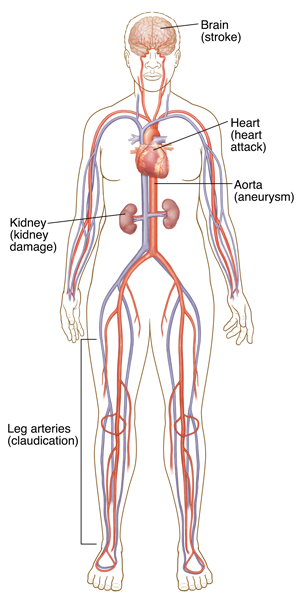Your Heart Is at Risk
Plaque and blood clots in the coronary arteries reduce blood flow to the heart:
-
When a coronary artery narrows, less blood and oxygen flow to the heart muscle. The decreased blood flow can cause symptoms of angina. This is often felt as temporary pain or pressure in or near the chest. This can also feel like pain in the jaw, neck, and shoulder.
-
When a coronary artery narrows too much, very little blood and oxygen reach the heart muscle beyond the site of narrowing. If a clot forms, blood flow in the artery may stop. This can result in a heart attack (acute myocardial infarction). If the muscle goes without oxygen for too long, that part of the heart muscle dies.
Your whole body is at risk
Plaque buildup in arteries can lead to problems throughout the body. Common sites of artery problems include:
-
Brain. Arteries in the brain or leading to the brain (carotid arteries) can become blocked. When this happens, blood flow to that part of the brain is reduced and that part of the brain can’t get the oxygen it needs. That portion of the brain is damaged. This is a stroke (ischemic stroke).
-
Kidneys. If an artery that carries blood to the kidneys is narrowed, the kidneys have a hard time filtering blood. This can lead to kidney damage.
-
Aorta. This is the body’s main artery. It connects directly to the heart and carries oxygenated blood from the heart to the body. If this artery wall is damaged, the weakened section of the artery can expand out like a balloon. This is called an aortic aneurysm. Over time, an aneurysm may get larger and weaker, and at risk to burst (rupture). This can cause life-threatening bleeding.
-
Legs. If arteries in the legs are clogged and narrowed with plaque, you can have cramping or aching in the buttocks, thighs, or calves when walking. This results from less blood flow to the muscles of the legs. The pain may be relieved with rest. This is called claudication (to limp). It may be a symptom of peripheral artery disease.
